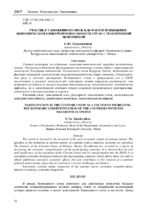Участие в Таможенном союзе как фактор повышения экономической конкурентоспособности стран с транзитивной экономикой
Another Title
Participation in the Customs union as a factor of increasing the economic competitiveness of the countries with the transitive economy
Bibliographic entry
Солодовников, С. Ю. Участие в Таможенном союзе как фактор повышения экономической конкурентоспособности стран с транзитивной экономикой = Participation in the Customs union as a factor of increasing the economic competitiveness of the countries with the transitive economy / С. Ю. Солодовников // БизнеС. Инновации. Экономика : сборник научных статей / редкол.: В. В. Апанасович (председатель) [и др.]. – Минск : Печатный Дом "Вишневка", 2017. – Вып. 1. – С. 22-37.
Abstract
Статья посвящена исследованию социально-экономической природы таможенных союзов. Уточнены особенности формировании таможенных союзов стран с транзитивной экономикой. Раскрыты особенности Таможенного союза Беларуси, России, Казахстана как фактора повышения экономической конкурентоспособности стран-участниц. Установлено, что роль и значение расширения Таможенного союза и превращения его в ЕАЭС заключается в усилении экономической интеграции между странами-участницами, что позволяет последним не только получать дополнительные синергетические экономические эффекты, но и способствует созданию общего политико-экономического пространства, устойчивого к внешним вызовам и угрозам.
Abstract in another language
The article is devoted to the research of the socio-economic nature of customs unions. The specifics of the formation of customs unions of countries with a transitive economy are specified. The features of the Customs Union of Belarus, Russia, Kazakhstan are revealed as a factor of increasing the economic competitiveness of the participating countries. It is showed that the role and significance of the expansion of the Customs Union and its transformation into the EAEU is to strengthen economic integration between the participating countries, which allows them not only to obtain additional synergetic economic effects, but also contributes to the creation of a common political and economic space that is resistant to external challenges and threats.

